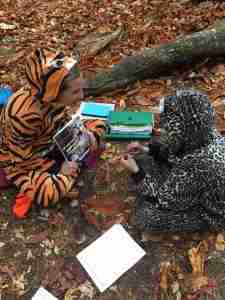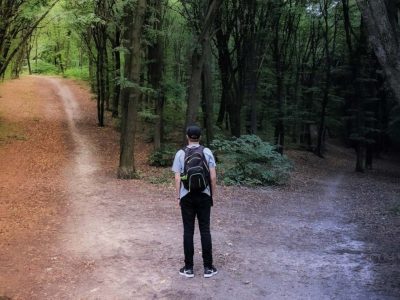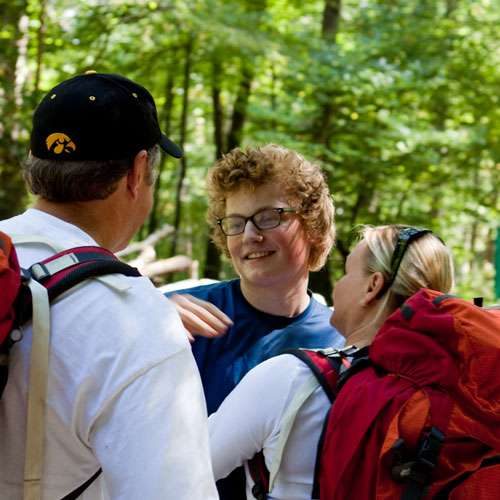 Derry O’Kane, MS, LPC, NCC, Trailblazers Primary Therapist, presented this information at the annual 2017 NATSAP Conference in January. The presentation was entitled.“Wildcat Onesies: A Creative and Play-Based Approach for Latency Aged Boys and Girls”. O’Kane presented alongside Elizabeth Lucarelli (SUWS of the Carolinas) and Katie Ford MS, NCC, LPC (Lake House Academy for Girls).
Derry O’Kane, MS, LPC, NCC, Trailblazers Primary Therapist, presented this information at the annual 2017 NATSAP Conference in January. The presentation was entitled.“Wildcat Onesies: A Creative and Play-Based Approach for Latency Aged Boys and Girls”. O’Kane presented alongside Elizabeth Lucarelli (SUWS of the Carolinas) and Katie Ford MS, NCC, LPC (Lake House Academy for Girls).
There have been all sorts of research and articles written about therapeutic approaches which help individuals who struggle with mental illness. However, most of those approaches make the assumption that a person’s brain has developed to the point where they can easily integrate and absorb the information expressed during the approach. This can end up being a problem for middle schoolers receiving treatment.
For many 10-14 year olds, the brain is in the middle of a transition period which may hinder their ability to achieve success through traditional therapeutic approaches. Because of this, my colleagues and I have designed a system which distills down broad clinical concepts into something that makes sense to the middle school brain. Through the use of play based activities, we teach clinical concepts to students, sometimes without even realizing they are being taught the concepts. This allows them to absorb information in a way that is much more meaningful to them.
Working with middle schoolers: A sacred responsibility
Liz, Katie, and I believe that working with middle schoolers feels very sacred. It feels sacred because these students are at an age where their thoughts and ideas are malleable. The information they learn during this period of brain development stays with them for the rest of their lives. We want to ensure that their developing brains absorb information that can change their lives for the better. As their therapists, we have a sacred opportunity to bestow wisdom and life lessons that will be empowering.
Using the word “sacred”, we developed an acronym which can be applied systemically throughout our programming with middle schoolers. This acronym looks like:
Sensory: Any viable middle school interventions need to include some sort of sensory experience (hearing, tasting, seeing, touching, moving, etc). It needs to integrate the sensory experience for students to remember it.
Authentic: Middle schoolers are authenticity police. They will disengage from you if you aren’t being authentic in your approach with them.
Creative: Thinking outside the box in your approach.
Risky: Any time you work with a middle schooler, you can’t have any agendas, expectations, or plans. Very quickly, you will learn that plans don’t usually work. You have to follow their lead and this can feel very risky because sometimes interventions fail. We need to embrace that working with middle schoolers can be risky and that sometimes interventions don’t work out. From there, you can learn what works.
Experiential: The facilitator must join with the middle schooler to develop an experience that transcends traditional talk therapy
Directive: Importantly, safety (both emotional and physical) remain priorities and thus the therapist must be confidently and calmly, directive. This creates a safe container within which the middle schooler can explore with little threat.
From each of these layers, we can develop interventions that are specifically targeted for middle schoolers.
Implementing a play based approach
Here are some examples of using a play based approach for Trails students:
- Wild Cat Onesies
During the winter, I break out fleece wildcat onesies for students play around in. While they are wearing these onesies, they can feel silly and playful. After spending some time in the wilderness, students begin to care a lot less about what people think of them. Before coming to Trails, they would never have put these onesies on for fear of ridicule. This is a great way to strip away all the worries and fears that have kept them stuck in really inauthentic versions of themselves and have fun promoting useful therapy techniques like the DBT concept Opposite to Emotion.
- Relay Race for Fire Building
Recently, I had a student who struggled to feel capable building a fire. I helped her break it down to the two parts of the process that were most difficult for her. From there, we created a relay race which involved her whole group. We split the group into two different teams to accomplish the one part of the fire she was really struggling with. Once the team accomplished the first part of building the fire, the student was responsible for blowing the fire into a flame and sustaining the fire for ten minutes. That intervention helped teach her that:
- It’s okay to break things down into little pieces
- She doesn’t have to feel overwhelmed in perfecting each step all at once.
- She can practice one step at a time.
- She can ask for help.
- There’s plenty of people around her that can collaborate with her and offer teamwork.
This activity was also a great way for the group to reflect on teamwork, the power of positivity and the power of fun. After this activity, the student was able to sustain the fire for a long amount of time. She is now one step closer to getting that assignment signed off and moving to the next phase of the program.
- Improv Exercises
One thing I’ve learned from working with girls struggling with social skill challenges is that these students are inundated with the term “social skills”. The minute you say to them “you need to learn social skills”, they completely shut down. Because of this, I have created a strategy that is similar to sneaking something healthy into a treat (like baking broccoli in chocolate chip cookies).
I use improv theater games to teach students social skills. These exercises involve performing improvised skits and giving the performers feedback. For example, after a performance I will ask, “How do you think they did in the relationship they showed onstage?” The students will say something like, “Well, they did okay. But I think they can do better.” I will then ask them how they could have done better. Students might say something like, “If so and so made more eye contact, or if so and so paid more attention to what the other person was saying then it would have been more believable”.
Through a theatre game, I’m teaching them what it takes to engage in a healthy relationship. It’s a fun activity and there’s always tons of laughter.
Trails Carolina can help
This combination of a play based approach and the power of wilderness therapy can help middle school aged adolescents achieve lasting success.
Trails Carolina wilderness therapy has helped hundreds of young people, ages 10-17, lay the groundwork for brighter futures and trusting, healthy relationships.
Get started today
Contact us today to learn how Trails Carolina can help your family
Trails saved my daughter’s life. Amanda is an amazing human and a brilliant therapist. I am so grateful to her, Science Steve, and the other wonderful people who could reach my daughter at a time when I could not.
Margot Lowman August 2022
Great life changing experience for our son. After becoming addicted to gaming during covid he was very depressed. At Trails he experienced the wilderness, Science Steve, learning survival skills and top notch therapy and support etc… I highly recommend! This gave our son and our family a renewed family bond full of love and excitement about his bright future.
Winnifred Wilson July 2022
Outstanding clinical work and superb staff! There’s a great culture at this company and it shows with how they engage with families/clients.
Kristin Brace June 2022
Discover If Trails Is The Right Program For Your Child
Take our short online assessment and help us better understand how we can help your family.




